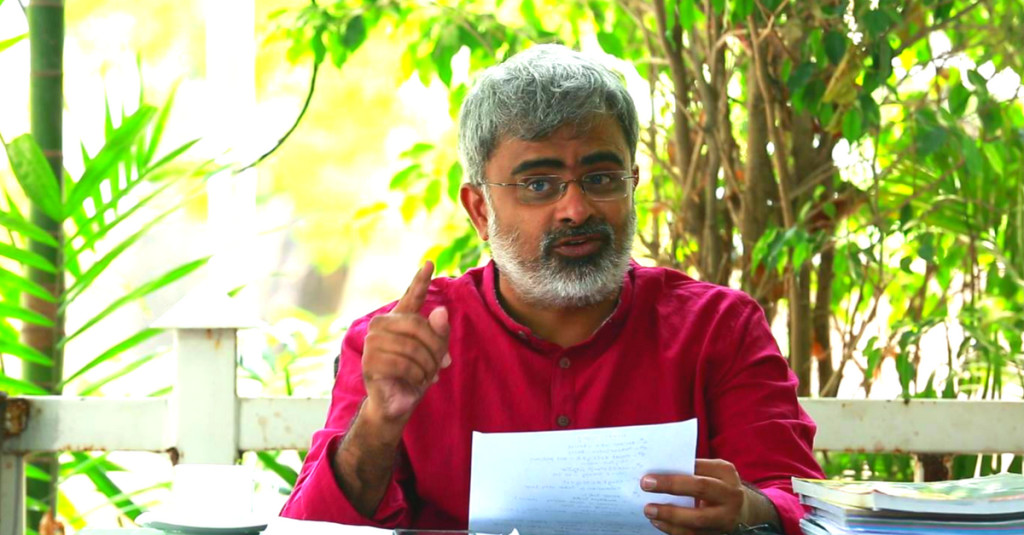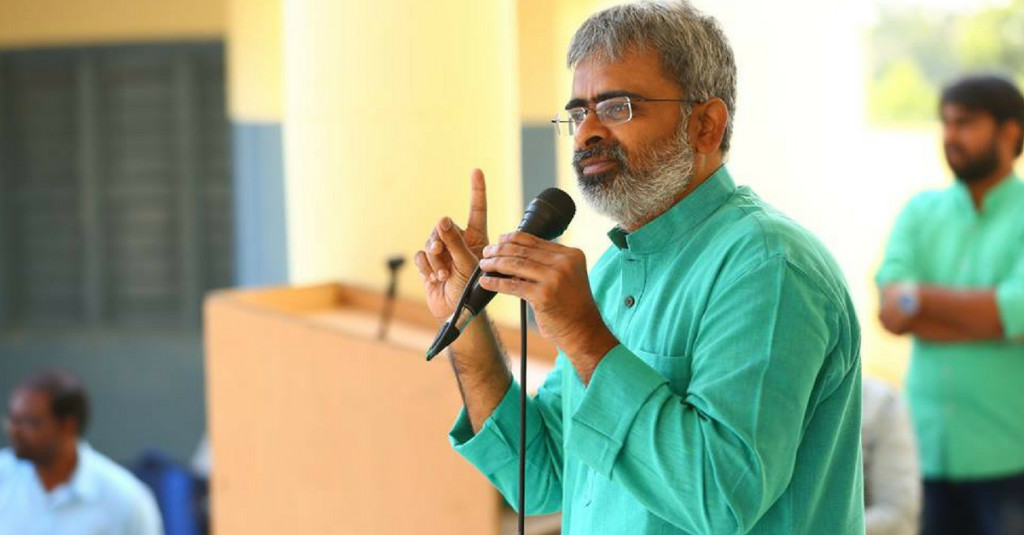After completing his graduation in 1994, he first attempted to crack the UPSC. One attempt turned to two, and two turned to four attempts. To no avail.
He was born in a middle-class family to Subrahmanyasarma, a small-time businessman and Suryakumari Lalitha, a homemaker, in June 1974.
Growing up in Rajahmundry (officially known as Rajamahendravaram) in the East Godavari District of Andhra Pradesh, Akella Raghavendra harboured one dream. To crack the coveted civil service exams.
After completing his graduation in 1994, he first attempted to crack the UPSC. One attempt turned to two, and two turned to four attempts. To no avail.
While he was able to get through the interview, he couldn’t get through the Indian Administrative Services due to a marginal gap of 12 marks. While one would assume that the repeated instances of failure after the many years of hard work would throw him off, Raghavendra refused to be deterred by the situation.
Today, Raghavendra is an educationist with over 20 years of experience, has worked as a journalist/columnist for leading publications like Eenadu, ETV, Andhrajyothi, been a film scriptwriter and has travelled across rural schools and colleges as a motivational speaker.
But one of the most important sectors that man behind the Akella Raghavendra Foundation has been working on is IAS coaching. Having exhausted his attempts at cracking the exam, he decided to put his knowledge into practice by establishing his own coaching centre in Dilsukhnagar in 2003.
Till date, over 500 of his students have successfully cracked the exam to work in various government services, like IAS, IPS, Group 1 and 2 ranks and other cadres.
Much like Bihar’s Anand Kumar, Raghavendra only takes up a single batch of 30-40 students and believes in giving them personal attention, mentorship and guidance. Many of these are students from underprivileged homes, and some of them are visually or physically challenged. Most of them come from Telugu and vernacular-medium schools after being shunned by mainstream coaching centres, says Raghavendra.
While Raghavendra coaches visually-impaired and physically-challenged persons free of cost, those coming from financially unstable families are given coaching at a subsidised fee.
“While any coaching centre charges a student Rs 1.5 lakh per annum on an average, we charge them Rs 30,000. The idea is to not dump study material on them but to critically analyse their day-to-day progress, tell them about their strengths and weaknesses and improve in those aspects to help them clear the competitive UPSC exam. I tell my students, ‘concentrate more on studying than the results. The means you resort to, are more important than the destination. If your means are right, you will reach your destination successfully.’”
He follows the E-Gurukulam methods of teaching where ‘e’ stands for electronic and ‘gurukulam’ is the ancient form of guru-shishya teaching. Under this, apart from offline classes, the students are given online training. He connects to each of them on WhatsApp. Daily timetables are set, reading materials are provided.
“The students have to diligently follow the instructions, complete their homework and send me the pictures of their work every day by 11:00 p.m., daily. My team members and I then work round-the-clock in the night to ensure these papers are graded by morning. Any student who is seen struggling, meets me for a one-on-one and we work together to tackle those issues,” he adds.
One of the latest projects of the IAS coach that has been gathering attention is his seven-year-long effort to come up with UPSC notes and study material free of cost for visually-impaired aspirants in the form of a Braille book. It is being lauded as India’s first-of-its-kind book for visually-impaired UPSC aspirants. In addition, he has also come up with free audiobooks which have been made available on his website online-ias.com.
When I ask him about the inspiration behind the project, he lays down the hard facts on the table.
He explains how India has over two crore differently-abled individuals out of which 10% are graduates. And if you were to consider the population of Telangana and Andhra Pradesh together, there are around 1 lakh visually-challenged and 70,000 other differently-abled graduates. Every one of them is eligible for a government job, but the biggest impediment in their way is the non-availability of study material in a format that they would find easy to absorb.
“To put it simply, we want blind and physically-challenged persons to achieve any government job they set their mind on. It is easy for an able-bodied individual to clear clerical or IAS exams, but many times it can be a huge challenge for the differently-abled. While mobility to attend classes on a daily basis is a challenge for some, many visually-impaired aspirants have to have someone read the entire portion for them, which is practically not possible. This is the reason we bought all the competitive exams material in Braille and audio format. This will make it easy for many to dedicatedly prepare for the exams in the comfort of their home,” adds Raghavendra.
This study material has been prepared using handpicked content from books he thought would be helpful for the Staff Selection Commission (SSC) and UPSC exams.
He adds how despite the availability of the number of books, he knew that they were not read by many. So his idea was to prepare a master file with just crisp and required information and make an audio version of it.
“For each of these students, we have a daily timetable where we upload three to four lessons a day, which they have to learn. We conduct weekly tests to monitor their progress and have video conferences to discuss their doubts,” he adds. So any student from across India can access the study material which currently consists of 3000 audios and 2000 pages in English with the password provided by his team.
“In the last five years, the percentage of physically challenged graduates applying for competitive exams is increased. Vasundhara, an IAS aspirant from Nalgonda who is physically disabled, requested me to help her to study from her home. Other visually-impaired IAS aspirants like Shivaprasad from Ananthapur, Sagar from Hyderabad moved me. They inspired me to help make study material accessible to other students like them,” he says.
Many of his differently-abled students are working in various government services. But Raghavendra adds how he is now motivating many to chase their IAS dream!
“We have three students preparing this year. We hope they make it,” he smiles.
In a final message to all UPSC aspirants, he says, “Be consistent in your preparations. Don’t leave your preparation midway till you reach your IAS dream. Stop not, till you reach the goal. For some it is a long, arduous journey, for others, it is a short war. No matter how many years it takes, keep persevering. You don’t necessarily have to be intelligent to crack these exams. Hard work and a smart strategy can help you make it through. Remember, if you take an elevator to reach your destination, there is a chance you may or may not reach your destination depending on technical glitches. But if you take the stairs, you definitely will. So believe in yourself. Your confidence makes a difference.”
If this story inspired you, get in touch with Akella Raghavendra at akellaraghavendra@yahoo.com or visit www.akellaraghavendra.com. If you are a UPSC aspirant, you can visit http://online-ias.com/
If you are a visually-impaired or differently-abled UPSC aspirant, get in touch with his team at 8897826108 to access the study material.
(Edited by Gayatri Mishra)
Article Source: The Better India


